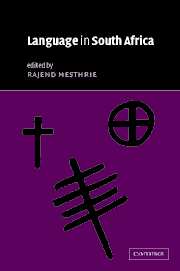Book contents
- Frontmatter
- Contents
- List of maps
- List of contributors
- Acknowledgements
- List of phonetic symbols
- List of abbreviations
- Introduction
- Part I The main language groupings
- Part II Language contact
- Part III Language planning, policy and education
- 22 Language planning and language policy: past, present and future
- 23 Language issues in South African education: an overview
- 24 Recovering multilingualism: recent language-policy developments
- Index
- References
23 - Language issues in South African education: an overview
from Part III - Language planning, policy and education
Published online by Cambridge University Press: 22 September 2009
- Frontmatter
- Contents
- List of maps
- List of contributors
- Acknowledgements
- List of phonetic symbols
- List of abbreviations
- Introduction
- Part I The main language groupings
- Part II Language contact
- Part III Language planning, policy and education
- 22 Language planning and language policy: past, present and future
- 23 Language issues in South African education: an overview
- 24 Recovering multilingualism: recent language-policy developments
- Index
- References
Summary
INTRODUCTION
South Africa is undergoing great change, not least in the areas of educational and language policy. We are moving away from policies that emphasised strong boundaries between languages and people, towards those that encourage people to learn and use many languages to communicate with each other. South Africans – a descriptor which only now includes everyone in South Africa – are urged to discard their old singular identities, rooted in an intimate bonding of race, language and culture, in order to embrace a more complex sense of self. This new South Africanism is dynamic: it is rooted in a previously unacknowledged commonality, forged through historic and economic processes, but it also acknowledges and gives expression to different languages and cultures (Alexander 1996).
Alexander – one of the main proponents of this view – argues that multilingualism, which challenges the inseparability of language, culture and identity, will play a large part in achieving this new identity. He sees education as an important means through which South Africa's multilingualism can be both validated and developed (1996: 11).
In this dynamic view of language and culture, multilingualism is seen as a resource to be drawn upon, in much the same way that Thornton (1988) views culture. This more fluid notion of languages, which does not insist on their separation or containment, is ever present in the educational language issues I have chosen to discuss in this overview.
- Type
- Chapter
- Information
- Language in South Africa , pp. 434 - 448Publisher: Cambridge University PressPrint publication year: 2002
References
- 23
- Cited by



